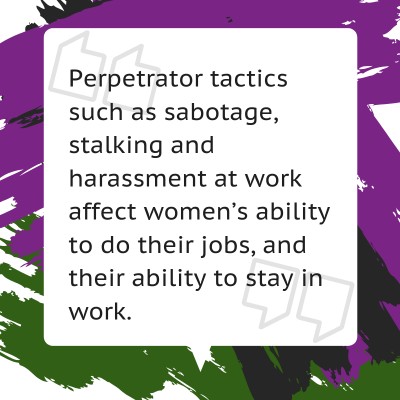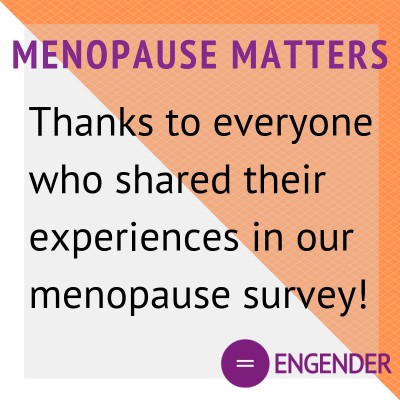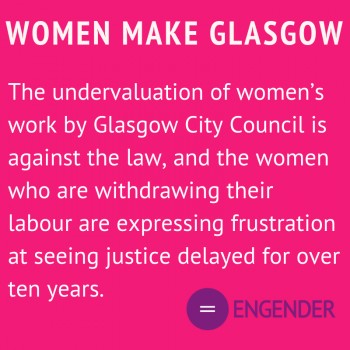Engender blog
Guest Post: Equally Safe at Work
Women’s labour market participation experts, Close the Gap, are running an exciting employer accreditation programme called Equally Safe at Work. We asked Programme Officer Kelsey Smith to give us an update on the project so far.

Violence against women (VAW) occurs at epidemic levels. It affects all aspects of women’s lives and the workplace is no exception.
Over 70% of women reported having experienced or witnessed sexual harassment in the workplace in Scotland. However, the vast majority (80%) of women who experience sexual harassment in the workplace will never report it due to fear of being blamed, not being believed or losing their job. Other forms of VAW, such as rape and sexual assault, can significantly impact on women's ability to hold down a job, as a result of needing to take extended periods off because of the emotional and physical impact. Victim-survivors often experience trauma which can make it increasing difficult to be in work situations which involve groups of men or being alone with men.
Menopause Matters: Ending the stigma

Last week, we said goodbye to our intern Elena Rodriguez, who has been working with Engender to conduct research looking at women’s experiences of the menopause in Scotland as part of her studies at the University of Edinburgh. Elena has been collating the 371 responses we received to our Menopause Matters survey in June, and here she writes to thank all those who took part in survey and explains what the results have revealed so far.
Dear Participants,
Thank you so much for engaging with the survey and sharing it so widely. Today we have 371 different experiences from all over Scotland, and your stories, views and suggestions of what should be done to ending the stigma around the menopause are precious.
We know it is a tough topic to be open about, and that many of you have had painful experiences with health professionals, managers and even family and friends. As many of you told us, it can be a confusing, tiring, frustrating and embarrassing process. We all need to understand it, not just women. We all need to learn about it at a younger age. We all need to be capable of discussing it without minimising it or taking it as a joke. We all need to involve and recognise the people that are struggling with it because many of them are doing so or have done so in silence.
Women Make Glasgow: Engender statement in support of the Equal Pay Strike

Engender stands in solidarity with the striking women workers of Glasgow City Council.
The work of carers, cleaners, caterers, and learning assistants has historically been undervalued and underpaid. This undervaluation of women’s work by Glasgow City Council is against the law, and the women who are withdrawing their labour are expressing frustration at seeing justice delayed for over ten years.
Low-paid workers have not taken the decision to strike lightly, and we are making a small donation to each of the GMB and Unison strike funds to help ensure that their action does not result in further financial hardship
Guest Post: A Woman’s Place is in the Kitchen (a professional kitchen, that is)
Guest post from Leonie Sooke
Leonie is a freelance chef and food stylist. Strongly influenced by working under a number of inspiring female head chefs, her career spans television; cookery books; London restaurant work; writing and presenting prominent talks for the V&A and Tate Britain, which showcase irreverent women in food history. Find her at curatedcakes.com or on instagram @Leoniesooke
Once again, this year’s employment figures highlight the inequality within the restaurant industry: data from the Office for National Statistics shows that only 18.5 per cent of Britain’s top chefs are women.[1] It’s an age-old problem. From Renaissance cooks and Victorian culinary masters to the macho celebrity chefs of today, men have taken centre stage on the professional platform.
Yet much has changed in the past few years. In the wake of pioneers such as Alice Waters, Ruth Rogers, Angela Hartnett and Margot Henderson, there’s a rising generation of young women taking the food scene by storm. Just consider Claire Ptak and Lily Vanilla with their pioneering bakeries, Florence Knight heading up the kitchen at Polpo or Kim Woodward at the infamously masculine Savoy Grill (to name but a few). The ‘boys club’ of late has certainly lost much of its cool.
Five reasons that media coverage of the pay gap is so bad (and why we think we should do better)
Yesterday saw the repeat of a ritual that happens a handful of times a year. An organisation - in this case the Chartered Management Institute - produces a figure it describes as a gender pay gap. News outlets contact organisations working on gender, or women and work, to ask for short quotes that explain both the pay gap and how we're going to fix it. These quotes are then strung together into pieces that are shaky on the facts and slight on analysis. In recent years, as the tenor of public discourse has softened slightly towards women's equality, they've been complemented by editorials denouncing the glacial rate at which the gap is narrowing. A couple of columnists may even take a swing at some particularly egregious examples of workplace discrimination, before the whole subject is unceremoniously bundled into an archive folder to wait for the next pay gap news release.
So why is there such fleeting, insubstantial coverage of this most pressing of gendered concerns? Why are we not having a grand conversation about women and work?
Downloads
 Engender Briefing: Pension Credit Entitlement Changes
From 15 May 2019, new changes will be introduced which will require couples where one partner has reached state pension age and one has not (‘mixed age couples’) to claim universal credit (UC) instead of Pension Credit.
Engender Briefing: Pension Credit Entitlement Changes
From 15 May 2019, new changes will be introduced which will require couples where one partner has reached state pension age and one has not (‘mixed age couples’) to claim universal credit (UC) instead of Pension Credit.
 Engender Parliamentary Briefing: Condemnation of Misogyny, Racism, Harassment and Sexism
Engender welcomes this Scottish Parliament Debate on Condemnation of Misogyny, Racism, Harassment and Sexism and the opportunity to raise awareness of the ways in which women in Scotland’s inequality contributes to gender-based violence.
Engender Parliamentary Briefing: Condemnation of Misogyny, Racism, Harassment and Sexism
Engender welcomes this Scottish Parliament Debate on Condemnation of Misogyny, Racism, Harassment and Sexism and the opportunity to raise awareness of the ways in which women in Scotland’s inequality contributes to gender-based violence.
 Gender Matters in Social Security: Individual Payments of Universal Credit
A paper calling on the Scottish Government to automatically split payments of Universal Credit between couples, once this power is devolved to the Scottish Parliament.
Gender Matters in Social Security: Individual Payments of Universal Credit
A paper calling on the Scottish Government to automatically split payments of Universal Credit between couples, once this power is devolved to the Scottish Parliament.
 Gender Matters Manifesto: Twenty for 2016
This manifesto sets out measures that, with political will, can be taken over the next parliamentary term in pursuit of these goals.
Gender Matters Manifesto: Twenty for 2016
This manifesto sets out measures that, with political will, can be taken over the next parliamentary term in pursuit of these goals.
 Scottish NGO Briefing for UN Special Rapporteur on Violence Against Women
Joint briefing paper for the UN Rapporteur on Violence Against Women.
Scottish NGO Briefing for UN Special Rapporteur on Violence Against Women
Joint briefing paper for the UN Rapporteur on Violence Against Women.

Newsletter
Sign up to receive our newsletter here:
Sign up to our mailing list
Receive key feminist updates direct to your inbox: